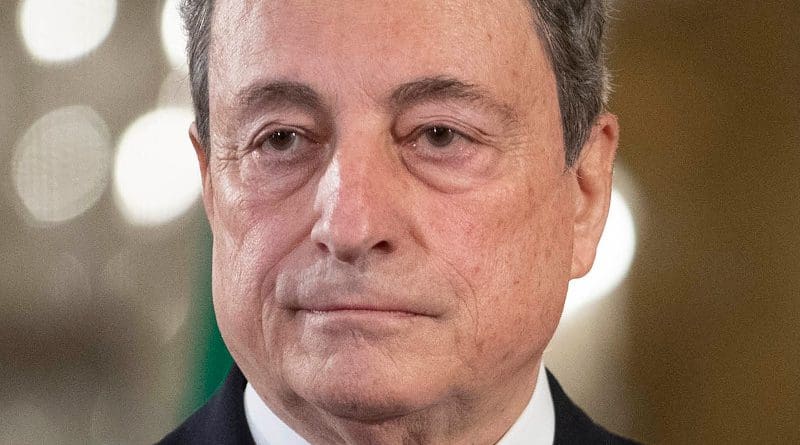Draghi The Right Man For The Job In Italy, And That Is The Problem – OpEd
By Arab News
By Dr. John C. Hulsman*
The American poet Robert Frost knew the nature of the founder of his country well. George Washington, in Frost’s shrewd estimation, “was one of the few in the whole of the history of the world who was not carried away by power.” In Ron Chernow’s Pulitzer Prize-winning biography, “Washington: A Life,” he makes it clear that, over and over again, the first US president made performance art out of his retirements.
Whether he was laying down his military commission to the Congress following the conclusion of the Revolutionary War or voluntarily leaving the presidency after eight highly successful years (rather than staying on in perpetuity), Washington, by his actions, made it clear that no one, not even him, was indispensable. For he intuitively knew that it is institutions, not men, that govern ultimately successful nations. As Chernow relates, Washington functioned as a pivotal transitional figure to a government of laws and not men, which made the pressing need for a man such as Washington no longer necessary.
On its surface, new Italian Prime Minister Mario Draghi is doing a pretty good impersonation of Washington. Draghi, 73, the former head of the European Central Bank, is credited with saving the euro itself. It is simply impossible to think of another Italian who has anything like the credibility Draghi possesses, both within his country and with other European leaders.
Like Washington, Draghi seems to have come back to power out of an overriding sense of duty, rather than out of any impulse for self-aggrandizement. Also, like the general, Draghi has made it clear he does not want to remain in power for long, hoping to leave at the time of the next Italian parliamentary elections on June 1, 2023. As with Washington, Draghi’s self-abnegation has proved to be politically popular with his countrymen. A recent survey in La Repubblica found that 85 percent of Italians approve of Draghi leading the new government.
Indeed, in thrall to both Draghi’s popularity and his reputation, he was able to form an extremely broad-based government, with the far-right Brothers of Italy being the only major Italian political party disdaining to join the new team. As a sign of his unique prestige, Draghi was able to bring into government the populist Five Star Movement and the far-right League, as well as more established parties like the center-right Forza Italia and the center-left PD. Literally no one else would have been capable of doing this.
But given the government’s daunting in-tray, Draghi’s impressive popularity is not expected to last for long. Beyond somehow and quickly rectifying a generational failure of the Italian governing elite, Draghi is tasked with efficiently vaccinating the country, as well as convincing — by the end of April — a deeply skeptical Northern Europe he has a plan to spend the massive €209 billion ($255 billion) set aside for it in pandemic relief funds.
Yet of all Italy’s problems — worthy of the Labors of Hercules — the sclerotic economy is probably the worst. As of the end of February, Italy’s official unemployment rate is 9 percent, with youth unemployment amounting to a sickening 30 percent. Fully 440,000 Italians lost their jobs in 2020. It has been estimated that Italian business foreclosures are set to increase a mammoth 73 percent this year. Likewise, Italy’s debt to gross domestic product (GDP) ratio is expected to climb to an Everest-like 160 percent. All this while Italy’s real economy is in freefall, with GDP decreasing 8.8 percent in 2020.
There is only one way out of this, and Draghi’s personally commanding economic presence is the key to Italy escaping the policy conundrum: How can such an economic laggard spend yet more money, which it simply does not have, to save itself?
In 2019, Draghi gave a speech that provides the immediate answer. He accepts that government debt levels will be exceptionally high for the foreseeable future. The key, then, is ensuring that Italian bond rates remain low enough to service this mountain of debt. Placing all his considerable credibility on the line, Draghi says the economic situation can be sustained only if “good debt is used for productive purposes,” rather than Italy just issuing the usual “bad debt for unproductive purposes.” And who is to make this key macroeconomic distinction? Who can convince the markets that they know the difference? Draghi, and only Draghi, of course.
Herein lies the rub, the point at which the new Italian premier functions as a sort of anti-Washington. If America’s founding father provided enough personal credibility and time for the new republic’s institutions to solidify and stabilize, how can we say the same of Draghi’s tenure? Given entrenched Italian institutional inertia, what will follow in his footsteps? Rather than serving as a bridge to an Italian rebirth, Draghi’s tenure is likely to resemble nothing so much as a bridge to nowhere, after which the same feckless and deeply undistinguished politicians who got Italy into this fix in the first place slouch back into power. Draghi is the exceptional man of the moment, but he is not an institution. That is precisely the problem.
- Dr. John C. Hulsman is the president and managing partner of John C. Hulsman Enterprises, a prominent global political risk consulting firm. He is also senior columnist for City AM, the newspaper of the City of London. He can be contacted via chartwellspeakers.com.

